- Home
- Peter Grainger
In This Bright Future: A DC Smith Investigation Page 4
In This Bright Future: A DC Smith Investigation Read online
Page 4
John Murray’s wound had healed well but, as expected, he would not be returning before the birth of the baby which should now be a couple of weeks away; Smith had visions then of being called to the hospital to witness it all as he wasn’t on duty… But the responsibilities of a godfather didn’t really extend as far as that, did they? All this meant that only Waters and Serena Butler had actually joined Wilson’s team. Why was his own seemingly always under-staffed? He hadn’t had four of them for more than a year. No doubt it was because he was always being given the misfits and strays.
Talking of which – ‘So is Serena in the office?’
‘No, she’s gone out with Mike this morning. She said she’ll be back before lunch.’
‘OK. Ask her to give me a ring when she is, will you?’
‘Yes. Anything I can do?’
‘No. Not unless you’d like to come and meet Helga when she arrives.’
Waters laughed and Smith could hear the relief in that, the sense that Waters finally felt that he had arrived somewhere that mattered.
‘DC, I don’t know why you think I’d want to meet a Swedish nurse…’ before the line went quiet. Smith thought again about Katherine Diver. It would almost be worth finding and paying a Helga to save the poor boy.
Serena Butler called him within half an hour – Waters must have contacted her on her mobile, and when Smith spoke to her he could hear traffic passing by and Mike Dunn’s voice shouting hello in the background. When she asked what she could do, Smith’s answer had surprised her.
‘I wondered whether you could drop by. Maybe after your shift? I’ll be here all day.’
‘OK… Do you need me to bring anything? A bedpan, maybe?’
‘Eh?’
‘Chris told me about your conversation earlier.’
‘Oh yes, most amusing. Make the most of your time in Wilson’s team – as soon as I get back, we’ll be having a shake-up. Far too much insubordination.’
‘I look forward to it. I’ll be having a late lunch by the look of it, so I could pop over then. Will you make me a sandwich?’
‘I don’t have any bread that big but I’ll manage something. Thanks.’
‘Any clue as to why I’m coming to your place?’
‘No. And there’s no need to mention it to anyone else but Mike.’
‘Ooh – more mysterious by the minute. See you soon, DC.’
‘I was only joking about the sandwich.’
He had laid out the possible ingredients on the work-surface before she arrived, offering her either a strong or a mild cheddar with various salad combinations or a chutney, or she could have the ham that came from a farm shop on the Lakenham road or he could do something with the prawns and mayonnaise he had in the fridge. And he could do either white or wholemeal bread.
Serena Butler made her choice, complimenting him on his catering skills, but he waved her away with a knife, telling her to go and sit down in the lounge.
‘You have a lovely place, DC. The outside doesn’t do it justice. Not that I’m implying anything about the front but…’
‘Thanks. It’s just where I live. Have a wander about while I do this if you like. The garden’s looking alright – go through the patio doors.’
She said that she would and then he called her back.
‘Tea or coffee?’
‘Oh. Tea, please.’
‘Assam loose-leaf or standard supermarket breakfast?’
‘I’m a standard supermarket sort of girl.’
‘One pot coming up. You have five minutes to complete your investigation.’
She went across the lounge and pushed open the patio doors. He had said that the garden was looking alright but she would have described it as beautiful, with a surprisingly long, closely cut lawn bordered by established perennials, shrubs and small trees. Thought had gone into the layout, and she could see that what first appeared to be the end of the garden was not; beyond the trellis work there was more hidden away. On the patio were numerous tubs and pots filled with fuchsias, geraniums and other flowering plants that she could not name. She stared at it all for a long moment and then went back into the lounge.
Shelves full of books, racks full of CDs, healthy houseplants – she thought guiltily about her own hopeless efforts in that department – a thick, wheat-coloured carpet, a matching three piece suite in dark, natural leather, the walls painted in different shades of beige and cream according to the angle of the light from the windows. Not much clutter, which drew one’s attention to the few items that were on shelves or window-sills. She moved closer to the photograph – a head and shoulders portrait of a woman looking not directly into the lens but somewhere beyond it; an intelligent face with serious eyes, surrounded by dark, wavy hair, difficult to age, but it must be her, his wife. Detective Inspector Reeve had talked about Sheila Smith that night as they waited in the car outside The Velvet Club. It must be three years or more since she had died but here she was, still watching over the room that she had created – that the two of them had created together.
‘If we eat in here, we’ll have to mind our Ps and Qs.’
Smith had come into the room and was looking from Serena to the photograph.
‘Or we can eat at the bar in the kitchen.’
They did that. She complimented him again on the house and its garden, trying to keep the surprise out of her voice – but it was impossible to tell whether she had entirely succeeded.
Smith said, ‘It’s too big for me, of course. I should move. Downsize, that’s what they’re saying now, isn’t it, the government and the local authorities? Raise the tax on people who have more than their allotted space so that we all live in appropriately-sized accommodation…’
She had never heard him make a political comment before, and she didn’t know how to respond. But the ham was delicious, and when she told him so, he explained to her where she could buy it and how important it was to support local producers, especially when they were friends of his.
‘I’ll go on Saturday and buy half a pig.’
Whatever was on his mind, whatever the reason had been for his asking her to come, he was taking longer than usual to get around to it – he smiled at her answer and drank more coffee. And then, as happened so often, he said something that suggested he had been reading her own mind.
‘I was going to ask you a favour but I’m having second thoughts.’
‘If it involves me watering your house-plants, that would be very wise.’
‘No, not that – if this only involved a risk to a couple of schlumbergeras, I wouldn’t be hesitating. But it might be more than that, and I don’t want to get anyone in any bother, least of all you.’
Because she had been in ‘bother’ already – that must be what he meant. So it was something to do with work, and now her curiosity really was aroused. She put down the teacup – proper bone-china if she was not much mistaken – and waited.
He said, ‘I’m thinking about going away for a couple of days.’
‘Sounds good – get some proper R and R.’
‘Yes. But it might not be quite like that. It might involve a bit of an investigation. I won’t know until I get there and talk to some people.’
‘And how can I help, DC?’
She could, of course, have asked where, who and why. That she had not done so said much for her, and his sense of hesitation deepened, but now he had waded halfway across and to turn back would be as tedious as to go over, at the very least.
‘I might need a bit of back-up as far as records are concerned. I probably won’t but it might be useful at some point just to look a couple of people up. I can’t do that from where I’ll be.’
‘It’s not a problem at all. Just ring me. We’ve all done it, looked up stuff that’s not directly linked to a case. I checked out one of my neighbours after I moved in, and-’
‘It’s not quite that straightforward. I’d give you my log-on details and you could do it as me – we could get our wrists sl
apped for that but actually I doubt that they could in that case even prove who’d logged on. That would keep your name out of it. If you use my machine in the office, even better. I know the dates wouldn’t match if they looked up my time off but I can’t see why it would ever come to that – I’m just being cautious.’
She was thinking it over now, and a part of him hoped that she would say no, she’d rather not, because he wasn’t sure about this. On the other hand, there was no-one else that he could ask. Murray would have done it with merely a shrug and ‘they’ could have questioned him about it until the cows came home, but Murray himself was away from the office for at least another fortnight. Waters would have done it and would have kept his mouth closed too, but it wasn’t fair to ask a youngster who had just that morning had his foot planted on the first rung of the ladder. And it would be wrong to ask Mike Dunn now that he was back in Wilson’s team.
Serena Butler said, ‘Of course I will. Just ring me and tell me what you need to know.’
‘Thank you.’
He seemed curiously solemn as he said that.
‘DC, can I ask one question? Where exactly are you going?’
He was gathering together the empty plates, cups and saucers now, and his answer was curiously light in contrast.
‘Oh, fair enough. You’ll know if I ask you to help anyway. I’m going to spend a couple of days in Northern Ireland. In Belfast.’
At his desk that evening he finished the letter that explained what he was doing and some of the reasons why. At the end of it he wrote a line of apology for not being able to fulfil his duties as a godfather, realising as he did so that he had, after all, been rather looking forward to that. Then he folded the letter neatly into three, put it into the envelope and sealed it. On the outside he wrote ‘John Murray’, and then he propped it up against the little brass dragon that he had used as a paperweight for many years.
He sat back and wondered idly who would open the letter, if it came to it. That he was being overly thorough he well knew – it was an indulgence that he still allowed himself occasionally. The people who might wish to do him harm must be much fewer in number than they had been back then; some must have died, others must have repented their ways or simply moved on with their lives. Presumably they did not pass on to the next generation a list of Englishmen who must die in the end for their crimes against the republic. Presumably the next generation was growing up freer of the prejudice and hatred that had scarred the one that he had known – look at Diarmuid Kelly, for example. There had been no sign of the poison in him, only a genuine desire to heal his family and lay one of its members to rest at last. Poor Brann O’Neill.
Smith opened the new Alwych notebook and looked again at the list of names he had written on the first page – it had to be a new one because this was not Kings Lake Central business, and he did not want the two things mixed up. Again the twinge of doubt at his decision to involve Serena Butler, but if he never called her then she never would be involved. There were five names because five was the number of men in the cell. Only one of them, the man in charge, would know the name of the next man above them in the ranks, the idea being that if a cell was compromised in any way, the damage would be limited. Naïve, but it might have worked had it not been for the Irish loves of talking and secrets and whiskey – not necessarily in that order - and of hints and nods and knowing winks; even spending a night in a bar with them would give an observant young man plenty to report, and he had, in the end, done much more than that.
Four of the names had been buried deeply, though they had not been, and never would be, forgotten. The fifth name could not have been buried, however hard he might have wished to do so, because it was known to every political journalist and commentator on both sides of the water. Quinn had moved on with his life alright since those times in the backroom of Rourke’s bar. Lorcan Quinn, leader of the cell; Lorcan Quinn, fanatic and psychopath in Smith’s considered opinion, was now Lorcan Quinn MLA, and a member of the power-sharing executive. Lorcan Quinn, who had more reason to wish Stuart Reilly dead, even now, than any other man in Ireland.
Chapter Four
There is no direct route from Kings Lake to Birkenhead and the train journey itself took a little over four hours – he passed the time reading an authoritative, academic book about the troubles that he had owned for years but never found the time for until now. It was like revising for an examination. And then the ferry journey itself consumed another eight hours – you can fly to New York and be riding about in a big yellow taxi in less time than that. Because it was so late in the day when he finally disembarked, he allowed himself the luxury of a black taxi instead but there was only an hour or so of daylight left and he saw little enough of the city that he was driven through; he had only the sense that much had changed, that if he had woken up suddenly in the Titanic quarter, for example, he would not have known where in the world he was.
Milford Place lay off Milford Street and it was only a short limp from there to Albert Street which was on one of the city’s Translink bus services; using it should take him into the western suburbs in only a few minutes. All this he had been able to plan from his study in Kings Lake, and he had been able to confirm those details, along with several others, with the landlady of the B and B when he telephoned her. She had said initially, ‘We can do our bookings on the internet, Mr Colgate, if you’d prefer that’ but when he remarked that if he was going to stay in someone’s house, he preferred the personal touch, she seemed to warm to him once she was over the surprise. Yes, the bus service was excellent, and another guest had changed their plans – she would be able to offer Mr Colgate a room with a view of St Peter’s Cathedral after all, if he wished, and the difference in the cost was minimal. Mr Colgate accepted her offer.
Mrs Greene was all double Us – warm, wide, welcoming and a widow. She told him the latter as soon as they met in the hallway, as if that was the important thing, as if once they had got that out of the way, matters could proceed as planned. To his right here was the breakfast room, eight until nine; she did not do the full English, she said - clearly as a matter of principle - but if required she was happy to produce a plateful of fried food. There were healthy options too, she pointed out with the air of someone vaguely puzzled as to why so few people chose them.
At the foot of the steep, narrow staircase she made no bones about staring down at his walking stick before saying, ‘Can you manage these with your leg there? Do you want me to take your bag, Mr Colgate? My other guest doesn’t arrive until tomorrow morning now. I could swap you over…’
Smith had little doubt that she could manage his bag on one fine shoulder and him over the other but he declined the offer of help. Just recovering from a minor operation, he said, an inconvenience, nothing more, and then he followed her ample form up the fourteen steps – always count them in case you need to go down them in the darkness. The travelling bag was only half-filled but he had to turn a little sideways to minimise the discomfort in his knee, and then it was awkward because the stairway was narrow – an old house, built when most people were thinner.
The room was perfectly decent; a little fussy, a little frilly even but not small, and there was indeed a window seat that gave a distant view of St Peters. That was the first thing that Mrs Greene pointed out, and Smith made the obligatory admiring remarks. He had the sense that the landlady was a member of that congregation, and on the wall that faced the single bed was a small print of the adoration in blue and gold, with the Virgin looking outwards to the observer of the scene – when Mrs Greene wasn’t keeping an eye on you in her house, another lady would be.
Smith said, ‘I forgot to mention on the phone that I would like to pay you cash if that’s alright, Mrs Greene. I took out more than I needed for another trip and don’t want to be carrying it around forever.’
Momentary surprise, and he felt a matching momentary annoyance; the aim was to be unmemorable, invisible and he wasn’t doing a particularly good job
of it so far. But the cash was not a problem, she said, and it would save her a trip to the bank maybe. While he was at it, then, he might as well deal with the other matter.
‘And my visit is a little open-ended. I’m not sure how long I’ll be staying but your room is just what I need, Mrs Greene. If I say three nights and pay you for that in advance, could you let me know if you have another inquiry for the room after that before you let it to someone else? I’m sorry to be a little vague.’
‘You’re going to pay me three nights in advance, Mr Colgate?’
‘Yes. With an option to stay a couple more if necessary.’
‘I see. Now I don’t do any discounts if someone pays in advance.’
‘No, of course not – the full amount that you told me when I called.’
Her face softened a little and it seemed that taking his money would not be too much of an issue for her, but, as he had anticipated, there were to be further questions now.
‘What exactly is it you do, Mr Colgate?’
‘Coffins.’
‘I beg your pardon?’
‘I’m an undertaker, Mrs Greene. I’m here to negotiate contracts to supply coffins to England. Irish oak is particularly valued by our more discerning customers.’
‘Oh, is it?’
She looked somewhat taken aback.
‘Very much so. But these are likely to be protracted discussions. One has to have a certain decorum in such matters even though it is still a business. And the cost! Dying is an expensive thing these days, isn’t it? Have you looked into it yourself yet?’
‘I – no, not directly.’
‘My advice to everyone is the same, Mrs Greene – plan ahead. It’s a terrible thing to leave to relatives. It’s the last kindness that you can do for them, isn’t it?’
‘I expect so…’
As Smith had hoped, she already seemed more inclined to leave him in peace than she had been a couple of minutes earlier but he pressed on.

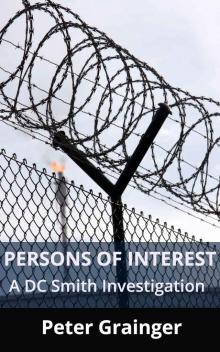 Persons of Interest
Persons of Interest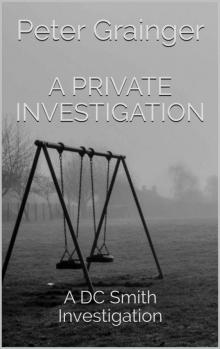 A Private Investigation
A Private Investigation Songbird
Songbird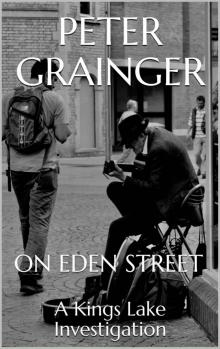 On Eden Street
On Eden Street An Accidental Death
An Accidental Death Time and Tide
Time and Tide An Accidental Death: A DC Smith Investigation
An Accidental Death: A DC Smith Investigation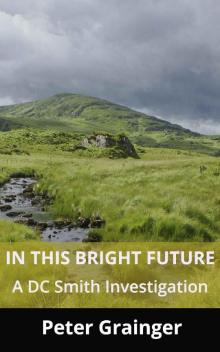 In This Bright Future
In This Bright Future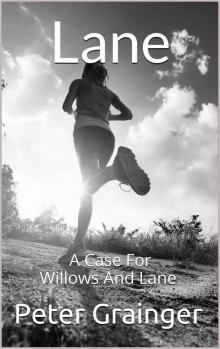 Lane: A Case For Willows And Lane
Lane: A Case For Willows And Lane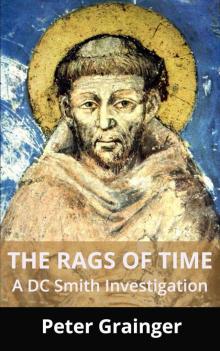 The Rags of Time: A DC Smith Investigation
The Rags of Time: A DC Smith Investigation Luck and Judgement
Luck and Judgement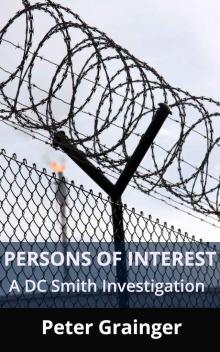 Persons of Interest: A DC Smith Investigation
Persons of Interest: A DC Smith Investigation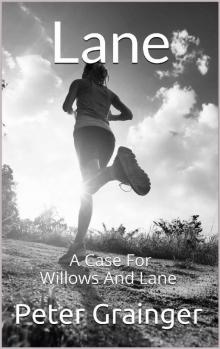 Lane
Lane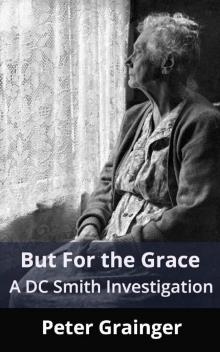 But For The Grace
But For The Grace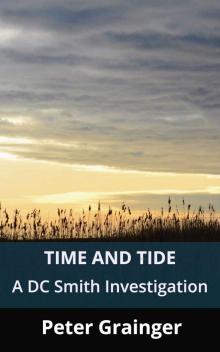 Time and Tide: A DC Smith Investigation
Time and Tide: A DC Smith Investigation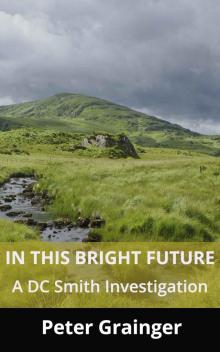 In This Bright Future: A DC Smith Investigation
In This Bright Future: A DC Smith Investigation The Rags of Time
The Rags of Time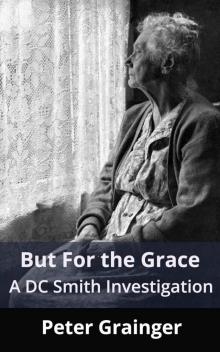 But For The Grace: A DC Smith Investigation
But For The Grace: A DC Smith Investigation Luck and Judgement: A DC Smith Investigation
Luck and Judgement: A DC Smith Investigation